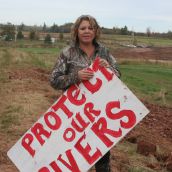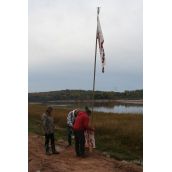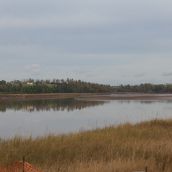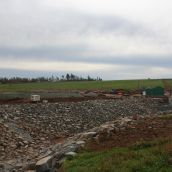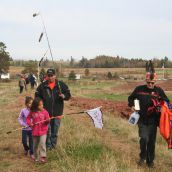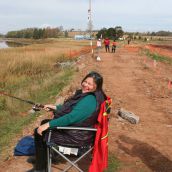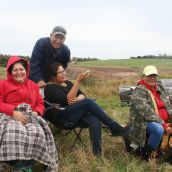(K'JIPUKTUK) HALIFAX – Mi'kmaq from Indian Brook First Nation and elsewhere, reinforced by local non-native supporters, held a well-attended fishing derby and protest rally along the Shubenacadie River near Fort Ellis, Nova Scotia.
Alton Natural Gas Storage intends to dissolve three huge underground salt caverns nearby and use them to store liquid gas. Protesters fear that the company's plan to dump the extracted salt into the river will harm the river habitat.
“We have to protect the river,” Cheryl Maloney, president of the Nova Scotia Native Women's Association, told the Halifax Media Co-op. “It has sustained us from time immemorial, now it is our turn to step up and do something back.”
Earlier this month the group organized traffic slow-downs along nearby highway102, and dropped eel traps in the river to assert its treaty right to fish at the proposed site.
Maloney believes that First Nations have not been sufficiently included in the decision to construct the facility.
"The M'ikmaq have a very strong case,” says Maloney. “Our territories, our rights, and our treaties have been recognized at the highest court, and the constitution protects them. And those laws require much more than mere consultation, you need consent. Ignoring that puts the Alton Gas project at risk.”
Leadership of the Sipekne'katik Band, the second largest Mi'kmaq band in Nova Scotia, has come out in support of the protests. Approximately 1,200 band members live in nearby Indian Brook First Nation. Chief Rufus Copage was at the protest, contributing a spear that community elders used for fishing in the river.
Each storage cavern will be about 80 meters high by 50 meters wide, and 1000 meters below the surface. To create the caverns, one 12 kilometres long set of pipes will carry water from the Shubenacadie River to the proposed storage site. A second set of pipes will return the water, now mixed with salt, to brine-holding ponds for subsequent release into the river.
Art Redden, a retired Natural Resources conservation officer and avid fisherman, joined the rally because he is worried what that salt will do to the river habitat. The river is one of the last to support striped bass, an aquatic species at risk. It is also a seasonal home to gasperau, smelt, eels and all kinds of waterfowl.
“People have no idea how much salt we are dealing with here,” says Redden. “Its a huge pile of salt, because these caverns are huge. To visualize how much, some say you should picture dump trucks bumper to bumper for 100 miles.”
The company, and the federal Department of Fisheries that approved the venture, have downplayed the risk. After all, the Shubenacadie River is a tidal river, and whatever salt gets added will soon be flushed out into the Cobequid Bay, they say.
Not so, says Redden. “It's 15 kilometres to the open bay, that's a lot of river that the salt can damage. The company has no information that they can give us as to what that current does. I remember when for two years there was an abandoned boat here that floated back and forth. Last time I saw it, that boat was at the same place where I saw it the first time.”
The river wasn't the only concern. Colin Hawks lives away from the river and near the construction site for the storage facility.
“It's a residential area, they told us that it's safe, but you wouldn't put this in downtown Toronto,” Hawks tells the Halifax Media Co-op. “They probably followed the letter of the law, but we didn't receive the notices, we didn't know anything about the two meetings, and nobody understood the actual size and scope of the project.”
A size and scope that may well expand, says Hawks. “You don't spend millions of dollars to put just three holes in the ground. I have seen plans for up to sixteen caverns. There is also talk about some kind of a plant up there. You can't get a straight answer.”
Jacqueline Clair came to the derby from Elsipogtog in New Brunswick, where earlier anti-fracking protests by Mi'kmaq and their Acadian neighbours were violently suppressed by RCMP. She also brought her son and daughter-in-law.
“We are here to support our Mi'kmaw families and friends in Nova Scotia,” says Clair. “When we were calling out the Nova Scotia Mi'kmaq came to help, and a lot of them were arrested. Some even ended up in jail for a long time. So I wanted to come here.”
Follow Robert Devet on Twitter @DevetRobert

